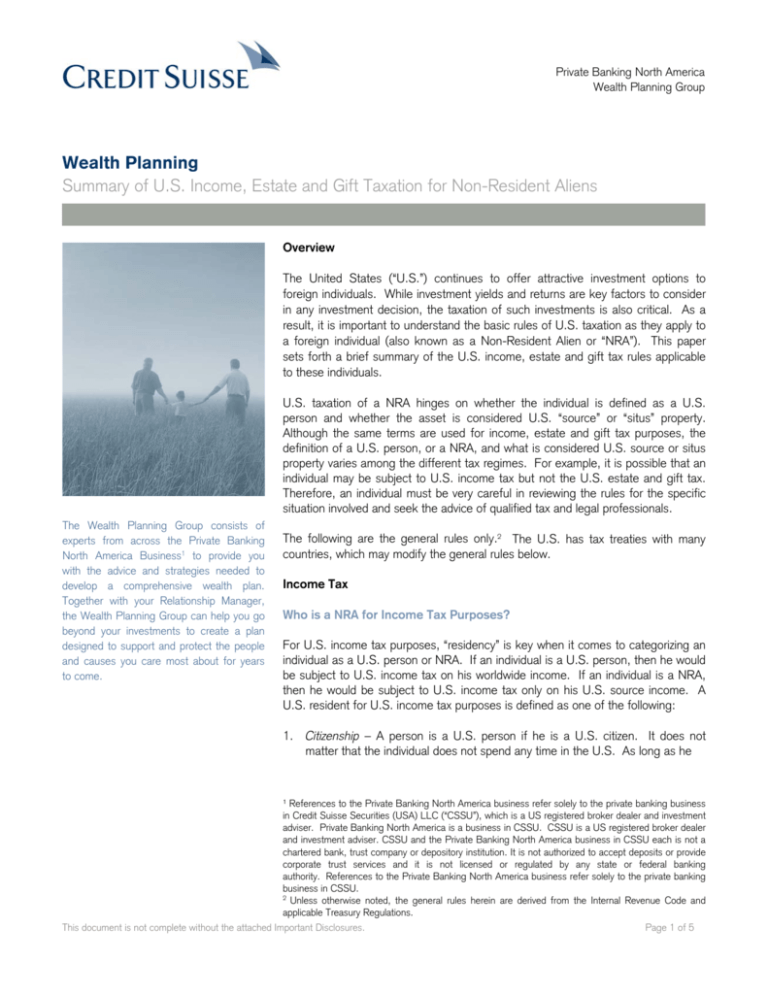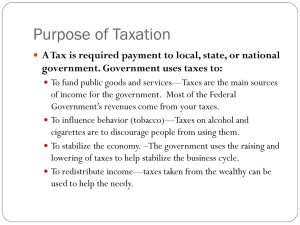
Private Banking North America
Wealth Planning Group
Wealth Planning
Summary of U.S. Income, Estate and Gift Taxation for Non-Resident Aliens
Overview
The United States (“U.S.”) continues to offer attractive investment options to
foreign individuals. While investment yields and returns are key factors to consider
in any investment decision, the taxation of such investments is also critical. As a
result, it is important to understand the basic rules of U.S. taxation as they apply to
a foreign individual (also known as a Non-Resident Alien or “NRA”). This paper
sets forth a brief summary of the U.S. income, estate and gift tax rules applicable
to these individuals.
U.S. taxation of a NRA hinges on whether the individual is defined as a U.S.
person and whether the asset is considered U.S. “source” or “situs” property.
Although the same terms are used for income, estate and gift tax purposes, the
definition of a U.S. person, or a NRA, and what is considered U.S. source or situs
property varies among the different tax regimes. For example, it is possible that an
individual may be subject to U.S. income tax but not the U.S. estate and gift tax.
Therefore, an individual must be very careful in reviewing the rules for the specific
situation involved and seek the advice of qualified tax and legal professionals.
The Wealth Planning Group consists of
experts from across the Private Banking
North America Business1 to provide you
with the advice and strategies needed to
develop a comprehensive wealth plan.
Together with your Relationship Manager,
the Wealth Planning Group can help you go
beyond your investments to create a plan
designed to support and protect the people
and causes you care most about for years
to come.
The following are the general rules only.2 The U.S. has tax treaties with many
countries, which may modify the general rules below.
Income Tax
Who is a NRA for Income Tax Purposes?
For U.S. income tax purposes, “residency” is key when it comes to categorizing an
individual as a U.S. person or NRA. If an individual is a U.S. person, then he would
be subject to U.S. income tax on his worldwide income. If an individual is a NRA,
then he would be subject to U.S. income tax only on his U.S. source income. A
U.S. resident for U.S. income tax purposes is defined as one of the following:
1. Citizenship – A person is a U.S. person if he is a U.S. citizen. It does not
matter that the individual does not spend any time in the U.S. As long as he
¹ References to the Private Banking North America business refer solely to the private banking business
in Credit Suisse Securities (USA) LLC (“CSSU”), which is a US registered broker dealer and investment
adviser. Private Banking North America is a business in CSSU. CSSU is a US registered broker dealer
and investment adviser. CSSU and the Private Banking North America business in CSSU each is not a
chartered bank, trust company or depository institution. It is not authorized to accept deposits or provide
corporate trust services and it is not licensed or regulated by any state or federal banking
authority. References to the Private Banking North America business refer solely to the private banking
business in CSSU.
2
Unless otherwise noted, the general rules herein are derived from the Internal Revenue Code and
applicable Treasury Regulations.
This document is not complete without the attached Important Disclosures.
Page 1 of 5
Private Banking North America
Wealth Planning Group
remains a U.S. citizen, he would be deemed a U.S.
person for income tax purposes.
2. Green Card – A person is a U.S. person if he has a
green card.
3. Election – A person is a U.S. person if he affirmatively
elects to be treated as a U.S. person.
4. Substantial Presence – A person is a U.S. person if he is
physically present in the U.S. for (i) 31 days or more in
the current calendar year; and (ii) 183 days or more
under the 3-year look back test based on a weighted
formula. The formula includes all the days of the current
year, 1/3 of the days of the preceding year and 1/6 of
the days in the second preceding year. For example, if
an individual spends 135 days in the U.S. in each of the
current and preceding 2 years, then he is a U.S. resident
for income tax purposes under the substantial presence
test. This is because under the formula, his total number
of days is 202.5 days, which exceeds 183 days: 135
days in 2013 (all the days in the current year), 45 days in
2012 (1/3 of the days in 2012) and 22.5 days in
2011 (1/6 of the days in 2011).
2. Income not effectively connected with a trade or
business in the U.S. (e.g., income generated from
investments).
Income connected with a trade or business in the U.S. is
taxed at the graduated income tax rates (currently a top
Federal rate of 39.6%). Income that is not effectively
connected with a trade or business is generally taxed at a
30% flat rate (or a lower rate if a treaty applies).
There are several important exceptions to the above rules.
First, certain interest from “portfolio debt” would not be
considered U.S. source income. This generally includes
interest received from U.S. government and corporate bonds.
Second, interest received from U.S. bank deposits are
exempt. Third, capital gain from sales of U.S. stock is also
exempt (note that capital gain from the sale of real property
located in the U.S. is generally taxable but will depend on the
nature of the real estate holdings). There is no exception for
dividends from U.S. stocks and they are taxed at a 30%
flat rate (or a lower rate if a treaty applies).
Estate and Gift Tax
Who is a NRA for Estate and Gift Tax Purposes?
There are a few exceptions to the above substantial
presence test, including: (1) certain Visa holders (e.g., a
student in the U.S. on a “F” Visa); (2) if an individual
were unable to leave the U.S. for medical reasons (does
not include those who come to the U.S. to seek medical
treatment); and (3) if an individual were in the U.S. for
182 days or less in the current year and can prove that
he has a “closer connection” to another taxing
jurisdiction. What is considered a “closer connection” is
largely based on the individual’s facts and circumstances.
For U.S. estate and gift tax purposes, “domicile” is key when
it comes to categorizing a person as a U.S. person or NRA.
If an individual is a U.S. person, then he would be subject to
U.S. estate tax on his worldwide assets upon death and U.S.
gift tax on his worldwide transfers during life. If an individual
is a NRA, then he would be subject to U.S. estate and gift
tax only on his U.S. situs property.
Of the four tests discussed above, the substantial presence
test is the one that may most likely be overlooked by foreign
individuals. Therefore, it is very important for foreign
individuals to be mindful of the number of days spent in the
U.S. and to keep a well-documented calendar.
1. Citizenship – Similar to the income tax rules, if an
individual is a U.S. citizen, then he is a U.S. person. The
actual length of time spent in the U.S. is irrelevant.
What is U.S. Source Income for Income Tax Purposes?
If an individual is deemed to be a NRA, then he would be
subject to U.S. income tax only on his U.S. source income.
Generally, U.S. source income is divided into two categories:
1. Income effectively connected with a trade or business in
the U.S. (e.g., income generated from a U.S. based
business owned by a NRA).
This document is not complete without the attached Important Disclosures.
Domicile is defined as one of the following for U.S. estate
and gift tax purposes:
2. Domicile – An individual acquires domicile in a place by
living there, for even a brief period of time, with the intention
to remain in that place. Once domicile is established, it is
presumed to continue until the individual establishes
domicile in another jurisdiction. For example, if a foreign
individual were to domicile in the U.S. and then later travel
to another country and pass away there, that person’s
domicile is still in the U.S. unless it can be proven that he
established domicile in another country before his death.
Page 2 of 5
Private Banking North America
Wealth Planning Group
Unlike the income tax rules, where the determination for a U.S. person has a bright-line objective test such as the number of
days the individual is present in the U.S., the estate and gift tax determination depends on domicile, which is a subjective test
based on the specific facts and circumstances. Below is a list of factors often considered for this purpose. This list is by no
means exhaustive and it is important to note that no single factor is dispositive.
Factors when considering domicile:
■ Relative time spent in the U.S. and other jurisdictions
■ Location, size and cost of residences
■ Location of membership to social clubs, religious organizations or other membership-type establishments
■ Location of business, bank accounts, personal property, etc.
■ Location of family members and close friends
■ Individual statements where the individual declares to be the domicile (e.g., declaration in the will or trust instrument,
application for bank accounts or visa)
What is U.S. Situs Property for Estate and Gift Tax Purposes?
If an individual is deemed to be a NRA, then he would be subject to U.S. estate and gift tax only on his U.S. situs property.
What is considered U.S. situs property varies depending on the estate or gift tax regime. Below is a chart summarizing certain
assets that are commonly held by a NRA.
Property Type
Tangible Personal Property in U.S. (e.g., artwork, jewelry)
Currency in U.S. Safe Deposit Box
Cash Deposits in a U.S. Bank
U.S. Real Estate
Non-U.S. Real Estate
U.S. Stocks
Non-U.S. Stocks
U.S. Government and Corporate Bonds
U.S. States/Muni Bonds
U.S. Partnership/LLC Interest
Retirement Plans
Life Insurance Cash Value
Life Insurance Death Benefits
Estate Tax
Yes
No
X
X
X
X
X
X
X
X
X
Depends3
X
X
X
Gift Tax
Yes
X
X
X
X
No
X
X
X
X
X
X
N/A
X
X
What may be some Planning Strategies to Mitigate the U.S. Estate and Gift Tax?
For individuals with U.S. situs assets that are subject to the U.S. estate or gift tax, proper planning is critical in order to mitigate
any potential tax liability. For example, a NRA may use a foreign corporation to hold his U.S. situs assets. Because shares in
a foreign corporation are not considered U.S. situs property, they are also not subject to the U.S. estate tax. It is important to
note, however, that the foreign corporation must be formed and operated such that the corporate entity is respected. In
addition, there may be other tax and non-tax issues relating to such a structure in the NRA’s home country. Tax and legal
advisors should be consulted to ensure that the proposed structure is appropriate for the specific situation.
3
It is uncertain whether U.S. partnership/LLC interest is includable for estate tax purposes. There is little authority on the issue and legal commentaries vary.
A possible treatment would be based on the entity approach which provides that the partnership/LLC is analyzed at the entity level for situs purposes. Another
possible treatment would be based on the look-through approach where each underlying asset of the partnership/LLC is evaluated for situs purposes.
This document is not complete without the attached Important Disclosures.
Page 3 of 5
Private Banking North America
Wealth Planning Group
What are the Rules Relating to Exemptions and Exclusions for a NRA?
In addition to the above mentioned rules, there are other important distinctions between the tax treatment of a U.S. person and a
NRA. Below is a chart summarizing the key differences for 2015.
U.S. Person
Estate Tax Exemption Amount
NRA
$5,430,000 per person4
$60,000 per person
Top Estate and Gift Tax Rate
40%
40%
Lifetime Gift Tax Exemption Amount
$5,430,000 per person4
$0
Annual Gift Tax Exclusion Amount
$14,000 per donee
$14,000 per donee4
Gift Splitting Between Spouses
Yes, if both spouses are U.S. people
No
Marital Deduction for Lifetime Gifts
Unlimited if recipient spouse is a U.S. citizen
$147,000 per year if recipient spouse
is a non-U.S. citizen4
Marital Deduction for Testamentary Bequests
Unlimited if recipient spouse is a U.S. citizen
$0, if recipient spouse is a non-U.S. citizen,
unless assets are held in a Qualified
Domestic Trust
Gift Tax Exclusion for Direct Payment
of Medical and Education Expenses
Yes
Yes
Portability5
Yes
No
4
Summary
Taxation plays a significant role for foreign individuals making U.S. investments. The U.S. tax rules are complex and vary
among the income, estate and gift tax regimes. Furthermore, the general rules may change if there is an applicable treaty.
However, opportunities exist and with the proper planning, U.S. investments will continue to be an attractive option for foreign
individuals.
4
5
Indexed for inflation.
Portability provides a surviving spouse with the opportunity to use the last deceased spouse’s unused estate tax exemption amount.
This document is not complete without the attached Important Disclosures.
Page 4 of 5
Private Banking North America
Wealth Planning Group
For More Information
Please contact your Credit Suisse Relationship Manager.
www.credit-suisse.com
Important Disclosures
This is provided to you by Credit Suisse Securities (USA) LLC (“CSSU”) for your information only. This is not intended to be
an offer or solicitation to purchase or sell any security or to employ a specific investment strategy. No part of this material may
be reproduced or retransmitted in any manner without the prior written permission of CSSU. CSSU does not represent,
warrant or guarantee that this material is accurate, complete or suitable for any purpose or any particular investor and it should
not be used as a basis for investment decisions. It is not to be relied upon or used in substitution for the exercise of
independent judgment. Information and opinions expressed by us have been obtained from sources believed to be reliable.
CSSU makes no representation as to their accuracy or completeness and CSSU accepts no liability for losses arising from the
use of the material presented.
This material does not contain all of the information that you may wish to consider and it does not take into account your
individual situation or circumstances. CSSU does not provide, and nothing contained herein should be construed as, tax,
accounting or legal advice; you should consult your personal accounting, tax, and legal advisors to understand the implications
of any investment specific to your personal financial situation.
The term "Credit Suisse" is the global marketing brand name for the investment banking, asset management and private
banking services offered by Credit Suisse Group subsidiaries and affiliates worldwide. Unless otherwise specified, the term
"Credit Suisse Private Banking" generally refers to the combined capabilities of Credit Suisse Group subsidiaries and affiliates
that provide private banking services to high net worth clients worldwide. The term “Private Banking North America” generally
refers to the private banking business within CSSU. Each legal entity in Credit Suisse Group is subject to distinct regulatory
requirements and certain products and services may not be available in all jurisdictions or to all client types. There is no
intention to offer products and services in countries or jurisdictions where such offer would be unlawful under the relevant
domestic law.
Private Banking North America is a business in CSSU. CSSU is a US registered broker dealer and investment adviser. CSSU
and the Private Banking North America business in CSSU each is not a chartered bank, trust company or depository
institution. It is not authorized to accept deposits or provide corporate trust services and it is not licensed or regulated by any
state or federal banking authority. References to the Private Banking North America business refer solely to the private
banking business in CSSU.
Internal Revenue Service Circular 230 Disclosure: As provided for in Treasury regulations, advice (if any) relating
to federal taxes that is contained in this communication (including attachments) is not intended or written to be
used, and cannot be used, for the purpose of (1) avoiding penalties under the Internal Revenue Code or (2)
promoting, marketing or recommending to another party any plan or arrangement addressed herein.
©2014 CREDIT SUISSE GROUP AG and/or its affiliates. All rights reserved.
This document is not complete without the attached Important Disclosures.
Page 5 of 5









